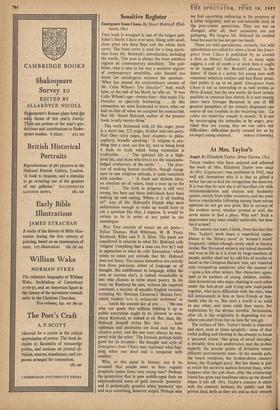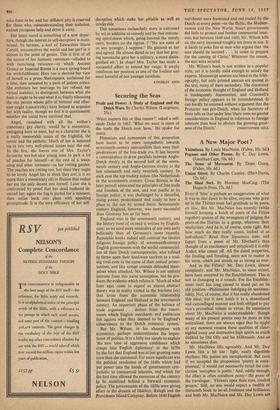At Mrs. Taylor's
Angel. By Elizabeth Taylor. (Peter Davies, 15s.) THOSE readers who have enjoyed and admired the work of Mrs. Elizabeth Taylor ever since At Mrs. Li ppincote's was published in 1945, may well ask themselves why it is that so gifted a writer has.yet to find the recognition she deserves. It is true that by now she is all laurelled o'er with recommendations and choices and laudatory quotes, mainly from older reviewers, and she must have a considerable following among those whose opinions do not get into print. But in surveys of the modern novel, whether printed or oral, she never seems to find a place. Why not? Such a deprivation may seem readily endurable, but how has it arisen?
The answer can start, I think, from the fact that Mrs. Taylor's work bears a superficial resem- blance to the 'library novel' or `women's novel' frequently vilified (though rarely read) in literary circles. Her favoured subjects are indeed domestic and true to life as it is lived by large numbers of people, neither eked out by odd bits of murder or incest in the Compton-Burnett vein, nor veneered with trumped-up sensitivity after the manner of —quite a few other writers. Her characters, again, tend to be mothers of young children, middle- class housewives who enjoy chatting to each other under the hair-dryer and trying new mud-packs together, who have difficulties with the char, who fall innocuously in love or have friends or hus- bands who do so. But such a world is as valid as any other, and more valid than many, for exploration by the serious novelist. Seriousness, after all, is like originality in depending not on where you start from but on how far you get.
The surface of Mrs. Taylor's books is objective and alert, even at times sprightly : none of that awful puffing and blowing in the attempt to focus a 'personal vision.' Her grasp of social interplay is enviably firm and unobtrusive, and she probes expertly the precise points of irritation where different environments meet—in the seaside pub, the board residence, the broken-down country house, the ill-judged party. But her theme is just as much the secretive sadness beyond these, what happens after the pub shuts, after the comforting friend has gone and loneliness takes up the thread where it left off. Mrs. Taylor's concern is often with the contrast between the public and the private face, both as they are and as their owners
take them to be, and her diffident pity is reserved for those who, misunderstanding their isolation, cannot recognise help and drive it away.
Her latest novel is something of a new depar- ture, though the interest in self-deception is main- tained. Its heroine, a sort of Edwardian Marie Corelli, misconceives the world and her part in it almost to the point of genius. This is first of all the source of her fantastic romances—alluded to with tantalising reticence—in which Ancient 'Greece or Imperial Russia is a mere spring-board for wish-fulfilment. Here too is derived her view of herself as a prose Shakespeare, acclaimed for a time, then unseated by a pack of jealous critics. She embitters her marriage by her refusal, her virtual inability, to distinguish between what she feels it ought to be and what it is, finally alienating the one person whose gifts of humour and affec- tion might (conceivably) have helped to acquaint her with reality, though we feel it is questionable whether she could have survived that.
Angel, visualised with all the author's customary gay clarity, would be a monstrous, swingeing bore to meet, but as a character she is a really memorable union of the frightful, the comic and the pathetic. Much of her is summed tip in two very well-placed scenes near the end. In the first, she forces one of Mrs. Taylor's favourite wet-but-nice young men to pick a lot of peaches for himself—at the cost of a wasp- sting and other torments—in her rotting garden. The peaches are rotting too, but since they ought to be lovely Angel has to think they are; it is no more than a momentary rift in illusion that makes her eat the only decent one herself. Later she is confronted by proof that her dead husband de- ceived her; again the fog is parted for a moment, then settles back into place with appalling promptitude. It is the very efficiency of her self-
deception which make her pitiable as well as intolerable.
This sometimes melancholy story is enlivened by wit in addition to comedy and by that entranc- ing spitefulness which, going beyond the merely catty, borders on the tigrine. (` "We are none of us any younger, I suppose." He glanced at her and agreed. He almost dared to say that her grey- ing moustache gave her a military, a more distin- guished air.') In Angel Mrs. Taylor has made a successful effort to extend her range. It amply reinforces her position as one of the liveliest and most forceful of our Younger novelists.
INGSLEY AM I S



































 Previous page
Previous page